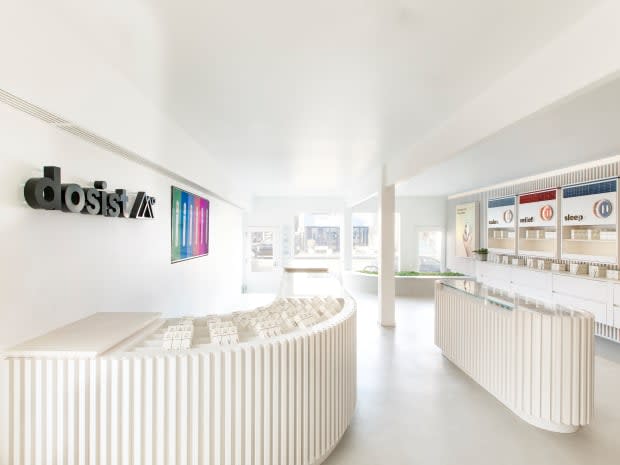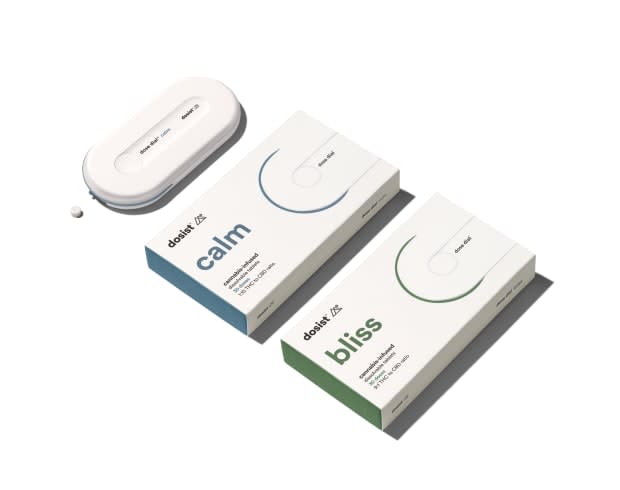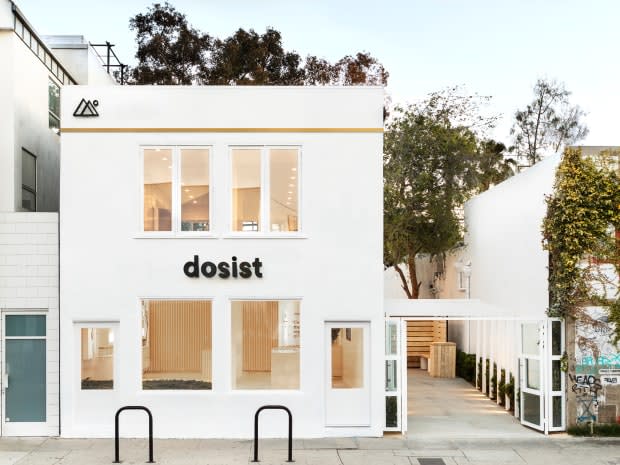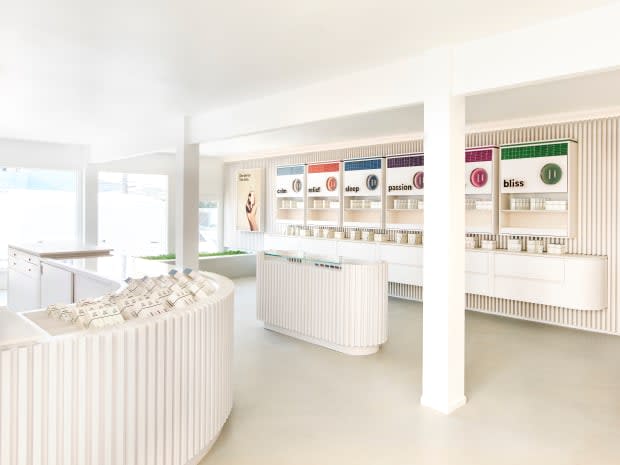Dosist Wants to Build a 'World-Class' Cannabis Brand Around Wellness, Not Getting High
It's off to a strong start.

It hasn't been two years since recreational marijuana use became legal in California, and yet the cannabis space has already become incredibly crowded with brands. Given that I live in the weed-filled bubble of Los Angeles, where smoking (or ingesting) the substance is as normal as drinking wine and there are dispensaries on every major street, I feel like I can only gauge the success and relevance of a cannabis brand by whether people outside of California are aware of it, and one that seems to have successfully cut through all the noise is Dosist. Since launching for medical use in 2016, the venture capital-backed company has been named a Time "best invention," a Fast Company "world changing idea" and a Business Intelligence Group "big innovation." It's also one of the few cannabis products people love to post on Instagram.
I remember seeing the L.A.-based brand's tampon-like (in a cute way?) pens on the social media platform before recreational use even became legal, back when it was called Hmbldt, and being instantly intrigued. While the name was very millennial-friendly what with its lack of vowels, the company changed it in late 2017 in part to emphasize its key differentiating factor: dose-controlled devices. When you take a puff from a Dosist pen, it delivers a precise 2.25mg of THC and buzzes when you can stop inhaling, allowing users to better control how much they take in and how they want to feel. The pens are also famously categorized by feeling, with each one's easy-to-understand function labeled simply on the device, whether it's bliss, sleep, calm, relief, arouse or passion.
In October, Dosist expanded outside of pens for the first time with Dose Dial, which is actually not a weed delivery service as I initially thought, but an aesthetically pleasing device that delivers dose-controlled peppermint-flavored dissolving tablets: In the spirit of a Pez dispenser, you can only dispense one at a time, which you do by twisting a dial.
Related Articles
Cannabis Companies Are Taking Cues — and Employees — from the Fashion Industry
As Brands Cash in on Cannabis, Are They Working to Dispel Racial Disparity That Still Exists Behind It?
A New Crop of Retailers All Want to Become 'the Sephora of CBD'

The biggest opportunity in cannabis is not just in selling it to stoners, but in attracting those who are less familiar with and/or intimidated by the substance, which Dosist does an excellent job of with its simplistic, accessible branding. It's one of several cannabis brands focused on de-stigmatization. Ultimately, it's not really branding itself as a cannabis brand at all, but rather a wellness one — with big, global ambitions.
"We believe in stepping fully into that narrative around wellness," explains CEO Gunner Winston. "We're not the only solution; we're part of a broader community of people who are talking about food and working out and we have a viable means of naturally providing ways for you to manage your health and happiness." It does that by crafting targeted formulas with THC, CBD and plant-derived terpenes that are found to have specific effects.
When I mention that a lot of my co-workers are into the brand despite living in New York and thus not having actual legal access to it, Winston isn't surprised, quickly describing why he thinks they're Dosist's target customer, and he isn't wrong: "I know nothing about them but I'm guessing they're globally productive citizens: people who are conscious of what they eat, conscious of how they work out; they're shopping at Warby Parker and Everlane; they might like a joint once in a while but they're not looking to get stoned because they have stuff to do."
In addition to wellness, Winston wants Dosist to be known for safety — something that's become more important in the wake of recent deaths associated with marijuana vaping (none of which the brand itself is associated with) — and almost treating cannabis like medicine: The Dose Dial's childproofing features go beyond what is require by law, for instance, and the brand's devices are all medical-grade (and recyclable, it's worth noting). You can also view lab results for all products on its website. By going above and beyond what's necessary to encourage moderation, and doing so with innovative and aesthetically pleasing design, he feels Dosist can get more consumers into the category.
"We're going in saying we have to accept some of the entrenched stereotypes that exist in the space and design is an important element to bring people into the category," says Winston. "We want this to sit next to your phone and if you want people to know [what it is] they will, but more importantly, we want people to be inspired by it and feel really happy to hold it in their hand and have that connection to our product that we think is important for any brand."

Dosist's pro-wellness, anti-stoner sensibility is embodied by its flagship "wellness experience" (not store) on Abbot Kinney Blvd. in Venice, adjacent to Gjelina. It also has a smaller space in West Hollywood on West 3rd. One of the only monobrand dispensaries in existence, the calming and sparsely designed flagship feels like a cross between the Apple store and Glossier and allows people to interact with and learn about the strains and terpenes used in each product; employees are not sales associates, but guides.
"Sometimes in the wholesale channel, you have trouble bringing your brand to life," says Winston. "There's a reason the Apple store exists; there's a reason the Chanel store exists. It's not because it’s the cheapest way of connecting to the consumer, but it often is the best way." The flagship is located on what is likely L.A.'s most tourist-heavy, highly trafficked retail street, surrounded by venture capital-backed, millennial direct-to-consumer businesses like Warby Parker, Everlane, Ayr, Cuyana — you get it. The rents are not cheap.
"[We are] willing to make an investment that doesn't always benefit us in the short term from a profitability standpoint, but really helps us build a world-class global brand," says Winston. "Part of it's also where we are and how we're set up: We didn't just do some little rinky-dink shop. We're on Abbot Kinney next to Gjelina, across from Warby Parker. Obviously we put a lot of time and effort into this property. This is not just a transactional brand; we're trying to build a forever brand."

It's largely about building awareness. Even if someone walks in and doesn't buy anything, he explains, that person might go and tell 10 friends about what a cool experience they had. In just the first six months of being open, he says people from all 50 states and 74 countries have visited the store. (Dispensaries are required to check IDs before allowing entry.) "It's in line with our goals to be a global aspirational brand; the output of this has exceeded the inputs which are time, money and effort," he says. According to a rep for the brand, Dosist has seen year-on-year growth of about 50% and is expecting to see 300% growth in 2020 given its plans to expand into new markets including Nevada, Arizona, Colorado and Michigan; it also recently launched in Canada.
Of course, it's important to note that Dosist and its leaders are in a privileged position to be building a business with cannabis and positioning it as an accessible wellness product when the war on drugs has unfairly put so many people — especially people of color — in prison for marijuana use, destroying communities and precluding those people from being able to participate in the legal cannabis business as a result. The company sees de-stigmatization as its way of addressing that.
"Dosist's advocacy starts with addressing the stigma around cannabis," says Chief Marketing Officer, Anne-Marie Dacyshyn. "Our products and platforms are designed and developed to put education first and foremost, to increase consumer access to critical information about the potential of cannabis as a powerful and natural therapeutic tool. Through the development and deployment of extensive education tools, training modules and education-forward activations at both the retail and consumer level, Dosist continues to be positioned as the leader in helping reduce the stigma that still exists." She also adds that, "it is a key initiative at Dosist to keep expanding our purpose, diversity and social programs as we grow."
"It's going to be a lot more of the same — a focus on safety and quality, never rushing just to create revenue," says Winston of the company's immediate future. In the next three months though there will be a new Dose Pen added to the lineup, as well as a non-THC product. Launching products without THC is becoming a popular strategy for cannabis brands looking to expand their reach outside of dispensaries and states where marijuana is legal. "That will allow us to be global quickly and be in places where you and I might just show up normally," he says. He also recently hired Dacyshyn, from Burton, to further help solidify Dosist's wellness branding.
"We have to continue to earn trust one consumer at a time," he says, "and I think when you have that perspective, you do have longevity."
Never miss the latest fashion industry news. Sign up for the Fashionista daily newsletter.
